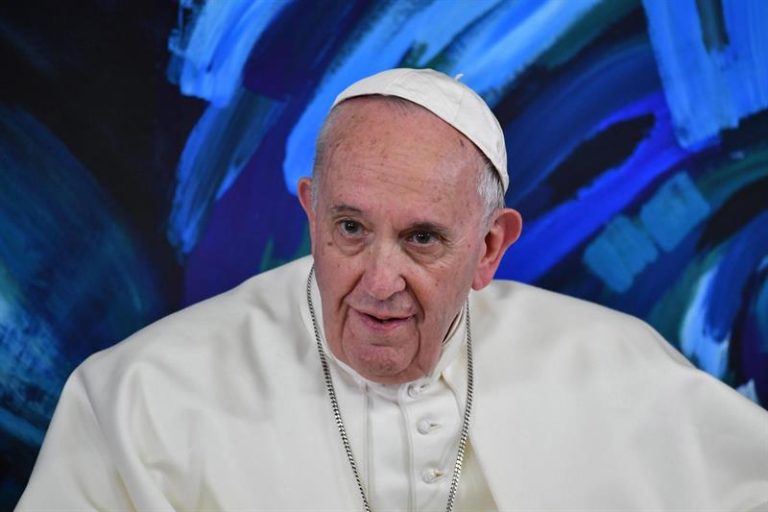16 de agosto 2022

Children of Exile: The Births “Sowing Hope” in the Camp of Nicaraguan Farmers

PUBLICIDAD 1M
PUBLICIDAD 4D
PUBLICIDAD 5D
What happens in Nicaragua should be denounced by the defenders of democracy and the DD. H H. around the world, starting with Pope Francis

"Acompaño con la oración esta iniciativa y animo a las partes a encontrar en la mayor brevedad una solución pacífica por el bien de todos"
It’s hard to decide what is more outrageous: Nicaragua’s dictator Daniel Ortega’s decision to shut down seven Roman Catholic Church radio stations and hold a bishop and his aides under house arrest, or Pope Francis’ total silence about these attacks on his own people.
Ortega and his wife, Vice President Rosario Murillo, closed down the Roman Catholic radio stations on Aug. 1. They were run by the Diocese of Matagalpa, a northern Nicaragua department whose bishop, Rolando Alvarez, is a frequent critic of the ruling couple’s human-rights abuses.
Hours after the radio stations’ shutdown, Ortega’s police broke into the Divine Mercy parish in the Matagalpa town of Sebaco, which operated one of the stations. The parish broadcast the arrival and forced entry of the police live on Facebook.
Days later, heavily armed police stopped Alvarez and six Catholic priests who were accompanying him from leaving their residence. The bishop and the priests have been under house arrest ever since, the Catholic News Agency reported.
The Ortega-Murillo regime accuses Alvarez and his priests of trying to “organize violent groups” to destabilize the government. In March, the government expelled Papal Nuncio Waldemar Stanislaw Sommertag from the country.
There’s little question that the Ortega regime is carrying out one of the harshest campaigns of repression against political dissent in the Western world.
Since the beginning of the year, the regime has closed down 1,406 non-government organizations, ranging from small theater production groups to internationally supported charities that ensure residents in Nicaragua’s poverty-ridden areas have access to health services and food, according to Nicaragua’s Confidencial magazine. The magazine, like virtually all other independent media, has been shut down in Nicaragua and publishes online from neighboring Costa Rica.
Ortega reelected himself in a fraudulent 2021 election, after outlawing major opposition parties and jailing the country’s seven leading presidential contenders. All of them remain in prison or under house arrest to this day.
In 2018, more than 300 Nicaraguans were killed and 2,000 injured by Ortega’s police and paramilitary troops during massive anti-government demonstrations. When I interviewed Ortega at his residence in Managua that year, he accused human-rights groups of making up the casualty figures, and assured me that the death toll had been only 195.
Carlos Fernando Chamorro, the publisher of Confidencial magazine, told me that Ortega is probably cracking down on the church because it is “the last remaining civil-society space that’s left in the country.”
But what’s truly hard to explain is why Pope Francis has failed to condemn — or even mention — the Ortega regime’s attacks on his own church. The Vatican’s representative to the Organization read a statement Friday, more than a week after the shutdown of the radio stations, expressing “concern” about the events in Nicaragua. But there has been no word directly from the pope.
“Pope Francis’ silence about the ongoing persecution against the Nicaraguan Catholic Church is unacceptable,” Tamara Taraciuk, a Latin American expert with the Human Rights Watch advocacy group, told me. “Considering that Nicaragua’s own Catholic priests are risking their lives to denounce Ortega’s abuses, what is the pope waiting for to make a statement in their support?”
The pope’s failure to make a statement on Nicaragua comes after several startling omissions on his part in recent months.
The pope has yet to visit Ukraine, the victim of the biggest foreign invasion in Europe since World War II. Yet, he found the time to make a six-day trip to Canada last month to apologize for the church’s abuses in the 19th century and in the 1970s.
The Nicaraguan tragedy has been buried in the headlines amid the Ukraine war, the China-U.S. tensions over Taiwan and the investigation into former President Trump’s possible stealing of top-secret White House documents.
But what’s happening in Nicaragua should be denounced by democracy and human-rights defenders around the world — starting with Pope Francis.
This article was originally published in Spanish in Confidencial and translated by Miami Herald
Archivado como:
PUBLICIDAD 3M
Escritor y periodista argentino. Ha colaborado en numerosos e importantes periódicos y cadenas de televisión. Trabaja para el Miami Herald.
PUBLICIDAD 3D